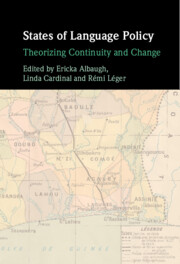Book contents
- States of Language Policy
- States of Language Policy
- Copyright page
- Contents
- Figures
- Tables
- Contributors
- Acknowledgments
- Introduction
- Part I Routes of Change
- 2 Universalism as a State Tradition in Norway and Its Impact on Language Policy Choices
- 3 Policy Change in a Language Regime
- 4 The Decline and Rebirth of Manx Gaelic
- 5 Cultural Heterogeneity and Language Regime Transformation
- 6 Language Regime Change in Peru
- Part II Dependent Relationships
- Part III Levels of Governance
- Conclusion
- Index
- References
6 - Language Regime Change in Peru
Authoritarian State Traditions and Unexpected Effects of Democratic Reforms
from Part I - Routes of Change
Published online by Cambridge University Press: 14 November 2024
- States of Language Policy
- States of Language Policy
- Copyright page
- Contents
- Figures
- Tables
- Contributors
- Acknowledgments
- Introduction
- Part I Routes of Change
- 2 Universalism as a State Tradition in Norway and Its Impact on Language Policy Choices
- 3 Policy Change in a Language Regime
- 4 The Decline and Rebirth of Manx Gaelic
- 5 Cultural Heterogeneity and Language Regime Transformation
- 6 Language Regime Change in Peru
- Part II Dependent Relationships
- Part III Levels of Governance
- Conclusion
- Index
- References
Summary
Peru is a multiethnic society whose postcolonial language regime was marked by the dominance of Spanish as the exclusive language of state bureaucracy up until recently. There are now forty-eight different Indigenous languages recognized by the state. The process of language regime transformation in Peru started with state traditions of monolingualism by defect, followed by incremental change in state recognition of Indigenous languages and the subsequent development of Indigenous language rights as manifested in constitutional and legislative norms. The adoption of a multilingual language regime based on linguistic rights for minorities was not the product of the Indigenous movement´s actions, nor those of ethnic parties. Institutional reforms that were not designed, and were not expected, to advance linguistic rights, allowed some actors the framework to accelerate incremental change.
Keywords
- Type
- Chapter
- Information
- States of Language PolicyTheorizing Continuity and Change, pp. 106 - 124Publisher: Cambridge University PressPrint publication year: 2024

